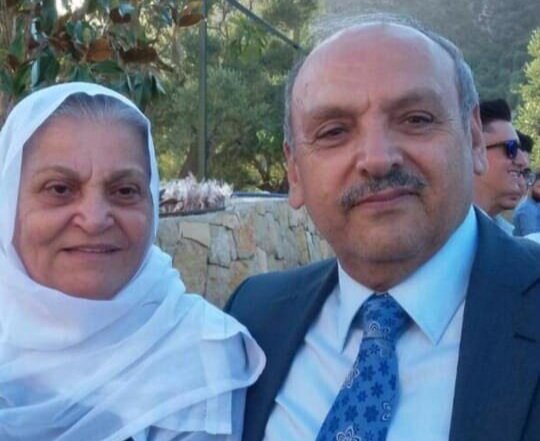
Hostage Spotlight
October 13th, 2021
ALI ABOUDEHEN
"At that point, you break and say yes to anything they tell you. By then you have no power to argue any of the charges, so you just accept your fate.”
“Inside Tadmur prison you are a missing person, and if you happen to get out, consider yourself a newborn” read the sign hung in front of Tadmur prison, where former hostage Ali Aboudehen recalls reading as he slowly stepped foot in what soon would be the start of his hell.
Ali Aboudehen, a Lebanese citizen, was illegally detained as a political prisoner in Syria for 13 years. Ali is from a town called Hasbaya, located in the south of Lebanon. In 1987, he attempted to obtain an immigration visa to Australia to escape the Lebanese war. Due to the war, all embassies in Lebanon were closed. Ali traveled to Syria instead, in hopes of visiting the Australian embassy and getting his visa. Ali, however, never made it to the Australian embassy. He was kidnapped in Syria in 1987 while enroute to his visa appointment. Initially he was charged with being a member of the Lebanese Forces, the Lebanese army that fought against Syria at the time, but later his charge changed to collaboration with Israel. Both of which were completely false. Unfortunately there was no court to prove his innocence, no lawyer he could seek, and no judge to even try him.
Ali was taken to Tadmur Prison and there he was interrogated, charged, and sentenced, all under physical and mental torture. As Ali entered Tadmur prison, he was accompanied by other prisoners who all had a similar story to his—Lebanese citizens that were falsely charged with crimes. As they entered the prison, they were blindfolded, handcuffed, and had leg irons. 30 guards awaited them in a long hallway—15 on each side—and as prisoners walked down, they were kicked and beaten with a whip on both sides. After the “walk of shame” was over, Ali recalls going through what they called the “reception party”. During a reception party, prisoners are forced to get inside a car tire and each person is whipped between 200 and 400 times on their feet. The prisoner must count every beating until they reach 250, if they lose count or even scream of pain, they must restart counting until they reach 250.
After the “reception party”, all prisoners were asked to sit on the ground. The general of the prison then walked in and said “Welcome to Hell, where there is no God, we are your God and we decide whether you live or not.'' Ali denied any collaboration with Israel, however, to break him and make him sign false documents, they put him in solitary confinement for more than six days. He was left without food and water and was not allowed to sleep. By the end of the interrogation period Ali described himself as a dead soul, emotionally and physically. As Ali described it, ”at that point, you break and say yes to anything they tell you. By then you have no power to argue any of the charges, so you just accept your fate.”
Torture in Tadmur prison for Ali and other prisoners was part of their daily routine. Warders were given a green light to do whatever they wanted to the prisoners whenever they pleased. After his interrogation, Ali was transferred to a jail cell with other prisoners who were mainly Lebanese. The torture never stopped, food was scarce, water was not clean, and basic necessities such as a mattress or toiletries were not available. In Tadmur, Ali was given one egg to divide with five other prisoners, one teaspoon of grains or beans for lunch, and one cold cup of tea for five prisoners to share. Some of his fellow prisoners were unable to survive and died in captivity. It was the prisoners’ duty to wrap the body in an old blanket and give it to the guards. The guards would then dump the body in a mass grave outside the prison. Ali recalls the smell of decomposed bodies at night lingering in their prison cells. For five years, Ali was denied access to his family, any outside news, or any outside connection. It was not until 1992, when Minister Rafiq Hariri made a deal with President Hafiz-Al-Assad (President of Syria at the time) to release 55 Lebanese hostages in Syria. The deal ultimately failed and the political hostages were never released, however, they were moved to a different prison which was called SaydNaya. Ali was fortunate enough to be amongst the political hostages moved to SaydNaya. Saydnaya was like a 5 star hotel compared to Tadmur. He spent the rest of his illegal detention in SaydNaya until Hafez-Al-Assad died and a new deal was proposed with the Lebanese Government to release some of the Lebanese hostages. Miraculously, Ali was among those released and he returned to Lebanon in 2000, scarred for life. Ali explained that the physical torture ends when you leave the prison, however the mental torture remains until the day you die.
Over 3,500 Lebanese citizens have been detained illegally in Syria since 1976. Currently, there are more than 600 Lebanese hostages detained in Syria and their families do not have access to them nor do they know if they are alive or dead. Unfortunately Ali’s story is just one of many and the Lebanese victims are left to fend for themselves. The Lebanese government does not provide any assistance to Lebanese hostages held in Syria and to those who have returned. As a result, Ali and other former hostages have launched a Foundation to help advocate for the remaining hostages in Syria since the government has been absent regarding this issue. We are hoping to shed light on Ali’s story in order to raise awareness on this issue and push for other hostages currently detained in Syria to be released. All proceeds raised by the Amer Fakhoury Foundation in the months of October and November of 2021, will be sent to Ali and his family.


